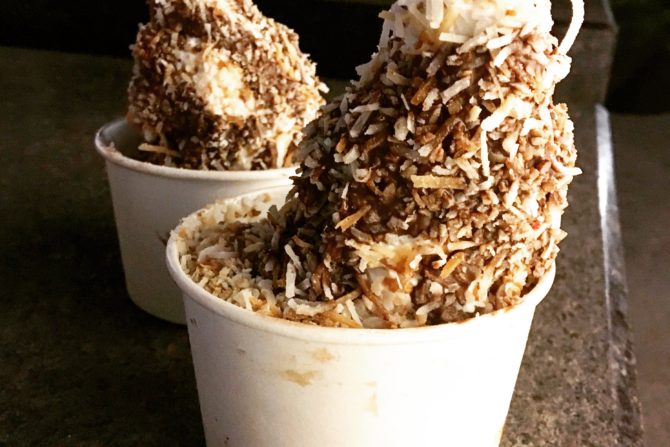Let me start by saying that I grew up a dairy lover – yogurt, cheese, ice cream, frozen yogurt – you name it. It was part of my childhood; from breakfast to dinner it was consumed in many ways, sometimes even multiple times a day for years without even thinking twice about it, until I did.
I didn’t just think about the taste that I loved so much, but considered the animals it was coming from and how “healthy” was dairy actually for my health. I reconsidered strongly and this is when I became “dairy-free” for a period of time. I took it all out every morsel of cheese, yogurt and even my favourite, frozen yogurt – but it wasn’t long before I started craving it again. I started to discover some of the alternatives that were available and way better for my health. Not to mention the health and welfare of animals as well. I made the decision at that time that I was giving a hard stop to cow dairy for many reasons. The prevalence of factory farms and how cows are dealt with in the food industry is not for the light hearted. To find out more about this – check out the documentary Cowspiracy.
I have now explored other forms of dairy from other animals (goat, sheep and buffalo) and for the most part I don’t even need or consume dairy at all. There are so many plant foods that are creamy in texture and rich enough in calcium along with many other nutrients that we get from milk, that the act of consuming dairy becomes basically for pure pleasure and not for it’s nutritional benefits.
Should we eat dairy?
Since the time we are infants, doctors tell us to consume large quantities of dairy to get enough calcium and we hear it time and time again throughout adulthood to prevent Osteoporosis. What if we told you there is an alternative way of getting enough calcium through better sources? We also don’t need as much calcium as we think we do. As long as your body is getting the right ones from good quality sources.
Some of these sources are still dairy based and others are not. Consider what makes sense to your lifestyle, your health requirements and your preferences overall.
Grass-fed vs. Conventional Dairy
100% grass-fed milk comes from cows that graze on pastures all year round. It is becoming quite popular due to the health benefits compared to conventionally raised cows. Grass-fed is a step up from organic as it’s the cow’s natural diet and therefore the healthiest for the animal, environment and the consumers. Grass feeding improves the quality of the milk produced making it rich in Omega-3’s Vitamin E and an important essential fatty acid called CLA, which improves our immunity and boosts our metabolism.
Conventional raised cows are subjected to small living quarters where diseases are spread easily and therefore antibiotics and growth hormones are widely used, which get transferred to the milk produced and ultimately to us. These animals are typically fed a grain and corn based diet, which is most likely contains GMO’s, pesticides and herbicides that leech into our milk and is not part of their natural diet.
Fermented Dairy
Kefir is a fermented milk beverage that is similar to drinkable yogurt in texture and taste (if you get the flavoured kind). By fermenting the milk with bacteria cultures, it boosts the nutritional profile that contributes to digestive and gut heath. Kefir is becoming more popular and can be found in most conventional grocery stores but make sure to look out for grass-fed kefir (e.g. Rolling Meadows). The benefit of consuming kefir, is that it is essentially pre digested. Your body has to very little work to digest it. As long as the milk itself is organic, this can be a very viable option for many dairy consumers.
Sheep, Goat and Buffalo Dairy
Many people can’t tolerate cow dairy at all. The increase of lactose tolerance is extremely prevalent. Luckily the milk provided by sheep, goat and buffalo serve us just as well in terms of nutrition. Not to mention the taste is far superior, especially with sheep and buffalo. These animals are not only raised in more ethical ways but the nutritional breakdown of their milk is much easier for the body to break down and tolerate. This is truly what is most important, how well are we digesting dairy and how is our body reacting to it – hopefully not at all.
Do we really need so much Calcium?
We are constantly bombarded with billboards, apps and commercials reminding us to get enough calcium but when is it too much? Having too much calcium in our bodies can actually do more harm than good. Too much calcium in the blood can cause Hypercalcemia, which can result in weakened bones, kidney stones and interfere with proper heart and brain functioning. Also, remember that the body needs adequate Vitamin D in order to absorb calcium. Without enough Vitamin D, there is lack of calcium absorption and thus, the body has to take calcium from its stores in our bones and that’s what weakens our bones rather than lack of calcium. Eating a diet rich in plants like mushrooms, dark leafy greens and eggs can ensure you are receiving adequate amounts of both calcium and vitamin D and most importantly, get outside into the beautiful sunshine for at least 20 minutes per day.
All this being said choose the dairy source that suits you or not at all. What pleases your palette and your belly? After all what we eat is all about how we digest and absorb it. Dairy is delicious but it comes in many forms and can even be recreated with real whole foods like cashews, organic tofu and avocado (see list below). Always make sure to go for food source alternatives vs soy based or other unnaturally derived forms of faux dairy. This is not food and most certainly does not contribute to health.
Alternative & plant based sources of calcium
- Dark leafy greens
- Broccoli
- Sesame Seeds
- Tofu
- Figs
- White beans
- Blackstrap molasses
- Tempeh
- Tahini
- Almonds
Alternative plant-based options for swapping out dairy
- Coconut (milk, yogurt, ice cream)
- Cashews (cheese, milk, cream)
- Avocado (add to pizza, sauces, sandwiches)
- Soaked nuts and seeds (almonds, sunflower, brazil nuts)
- Hemp seeds (sprinkle on anything for extra texture and crunch)
- Sweet white or light miso (use instead of parmesan for pesto and other sauces)
- Soft organic tofu


